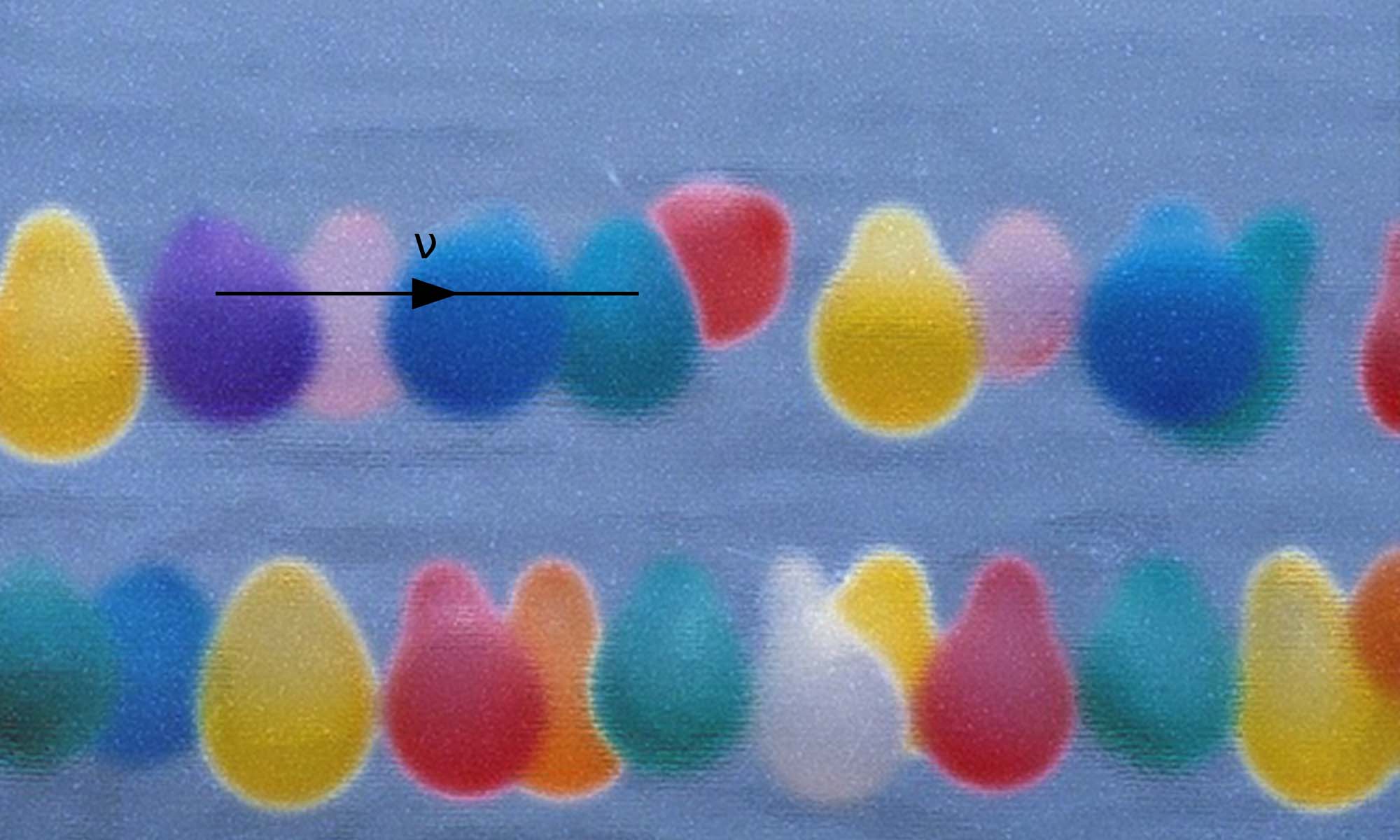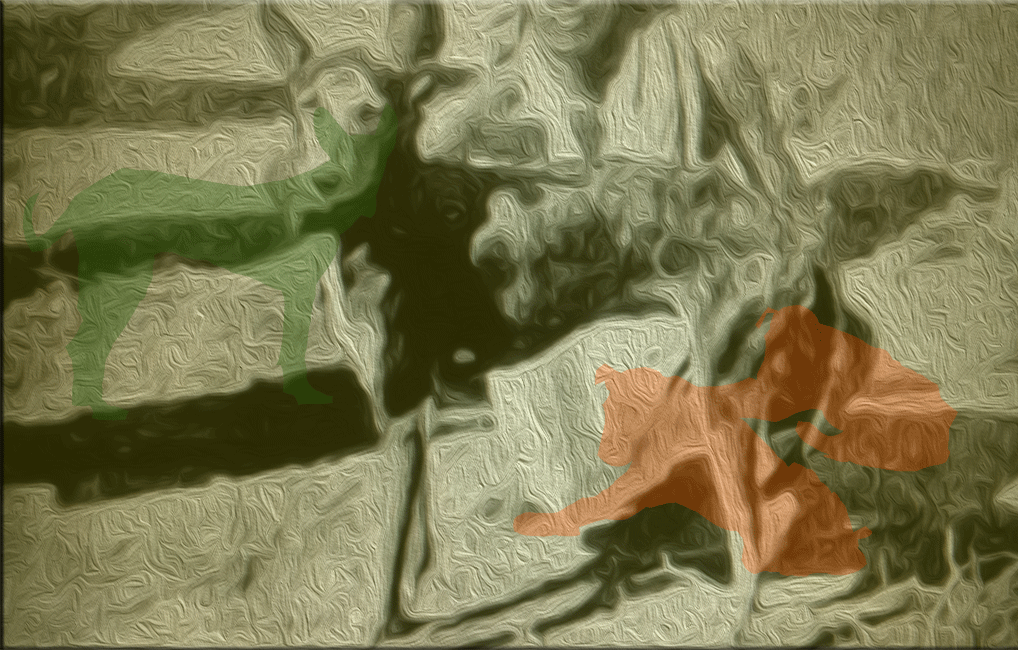The Empyrea Senior Community’s public line is to weather this pandemic like a storm. Batten the hatches. Seal the doors and windows. No visitors, no public meals, orderlies are to be our only contact. I am only let free for the sake of my dog, Charley.
Today, we wander the garden. It’s that or the parking lot. While Charley pees on the petunias I wave a merry hand to my neighbors, locked away for their own safety. Most shades are drawn, who knows what life beats beyond them. When Charley stops to sniff the irises, I pull him away and pick them. They are a deep purple, almost black, and their yellow pollen looks like stars against a gloaming sky. They will be as good a memento as any. I knock on Magda’s window. The orderlies are too busy to notice our mutiny. She cracks the window, I slip her the flowers, she pats my hand, and I steal away.
An orderly left lunch by my bedside. They moved my book, knocked over my plastic cherry blossoms, and the TV remote is on the olive-green linoleum floor. The chicken is frozen and there is no fork. I push it to the floor for Charley. He doesn’t sniff it, only harrumphs with his nose held high and waltzes to his vermillion and downy bed. My fault. I forgot that he is a dignified Frenchman. I genuflect to his preeminent poodle mien in apology. Let the chicken rot, we’re not staying long.
The book the orderly moved is one I wrote. It is about neutrinos. Carl Sagan read it and bought me a drink. The Evangelicals read it and called it a piece of Atheistic idealism. I don’t know which testimonial is dearer to my heart.
I wrote the book as a young woman. The gravity of my personhood was orders of magnitude greater then. I had an office, a desk too heavy to lift, an assistant, and a Meteor Pen. Meteor fragments were fused into its body. Each time I signed my name, always in purple, the event horizon of scientific endeavor shifted, for better or worse, slightly.
When I reread the book in my Altoid-can room, the pages talk less of neutrinos and more of little old ladies. Especially little old ladies reduced to spying on neighbors for entertainment.
I see neutrinos as cosmic voyeurs. Fired out of starry crucibles, they fly uninhibited to the universe’s edge. They are so small, with such a slight mass, that they can slip through an entire planet like an Odyssean arrow, missing every single atom. Some call them ghosts. But even a ghost can rattle the pans, slam a door, and raise goosebumps on the back of your neck. Neutrinos were invited to the cosmic ball but were never asked to dance.
I feel that way. From my thread-bare chair, I run my knotty fingers over the TV remote buttons. The faults and the fears of the world centrifuge before me on the TV. It’s a maelstrom in the elderly quietude of my Salvation Army chic refuge. Charley can ignore it. He hasn’t been political since the Kyoto Protocol floundered. Yet I reel. Sometimes, I think I can hold the world. That I might cut it, mold it, shape it with my Meteor Pen. But generally, it is beyond me. I am an old crone in duckie slippers. The world turns and I watch, pulling stuffing from my chair, just to prove that I’m still real.
My daughter’s family brought me balloons before the quarantine began. They float haphazardly from slackened strings. They are my calendar. I measure the pandemic by how close to the ground they sink. And they are my scrapbook. Willem Dyer gave me a green one when we graduated college, a blue one on our wedding day, and filled our first house with purple ones before I ever stepped through the door. I brought a bouquet of yellow ones to his wake. My daughter’s are red. They bobble above my unused desk. If I could still wield my pen legibly, I would attach little notes to these balloons and send them out the window. Send Help, SOS, A hundred bucks and a pack of smokes to whoever gets me out.
When I watch the bumbling bumping of the balloons my mind grows unmoored. It shoots beyond the Earth’s orbit, through the Kuiper Belt, and out past the Oort Cloud. The nurses think I’m feeble-minded. I am slow to respond to their questions and rarely track what they say. But I am simply preparing.
I will become a neutrino, so I must travel as they travel. Light.
Imagine the eons of their journey. They spend millennia shooting toward distant starry pinpricks, and FM radio gets spotty past the ionosphere. Memory becomes their only in-flight entertainment. They log light-years in reminiscence.
So I pick my memories out like outfits. The smell of springtime wisteria as I receive my PhD, illicit love with Leonard in a lumpy bed, my daughter’s chubby finger tracing my palms like a star chart. And I pack them away.
There’s nothing else to take. I’ve looked around my dowdy room for anything. The armchair, with its brown Ike-shaped stain, was here when I arrived. Someone (Magda) stole my jewelry box. I’d take the scarlet poppy paintings but they’re only prints, and shoddy ones at that. Charley will miss his toys, but he sees sacrifice as divine.
I’ll only miss my body, and it’s the one telling me to go.
My back says I can’t reach Charley’s canned food on the bottom shelf. My knees are a constant crackling peanut gallery. Conversations with my family are dependent on my mind’s mercurial focus. Most are punctuated with a continuous “Mom you still there?” Simply, my body is tired. Where once there was a wellspring of vitality and energy enough to leave a phallus in the admin’s attendance chart, now there’s only a fart of get-up-and-go and my stomach is too frail for more beans.
Charley’s coming too. We both itch to leave. To wander. We once wanted our own piece of the Berlin wall. To pee in every ocean. But now our gaze drifts upward. A star was just born, and I want to see it before it dies. Magda’s naked cat says Teergarden B has life and Charley wants to sniff it. I promised Charley a visit to the dog star, and Saturn winks at me every night. For now, we entertain ourselves simply; picking fossils from the pebble path; slipping the squirrels my valium; and twirling for the mirror in moth-eaten gowns.
There’s not long to go now. We are neutrinos in everything but form and that will change as well.
Tonight, Charley and I will wait for the dinner time orderly. She will let me use her phone to call my family. I want to hear them shout, “We love you Gran!” loud enough for me to hear. Next, I will open the windows and release the balloons, they don’t do well caged. Charley will reread his will, everything to the squirrels, can’t let Magda’s cat get the toys. We will both joyfully relieve ourselves one last time. Charley on the chicken, I on the remote. With that done I will hold Charley in my arms and we will turn into neutrinos.
The process is simple. Neutrinos are only the byproducts of decay. The potassium in our bodies creates them naturally. I think of each as an escape pod from my body. Charley and I will each hijack our own little pod and flee. We will become balloons, slipping from our bodies, passing through the ceiling, and then floating into the stars.
We will observe the dimming firelight of the universe. We will see galaxies sail into each other; accretion jets form, ignite, and fade; black holes whirl space through the cosmic washing machine; and finally, see entropy waste it all away.
We will be there for it all. Until finally, when all but the last few photons burn like fireflies around us, I will pick one as a flower for Charley. He will sniff it, I will pat his paw, and we shall turn out the midnight lights and slip away. ▩

